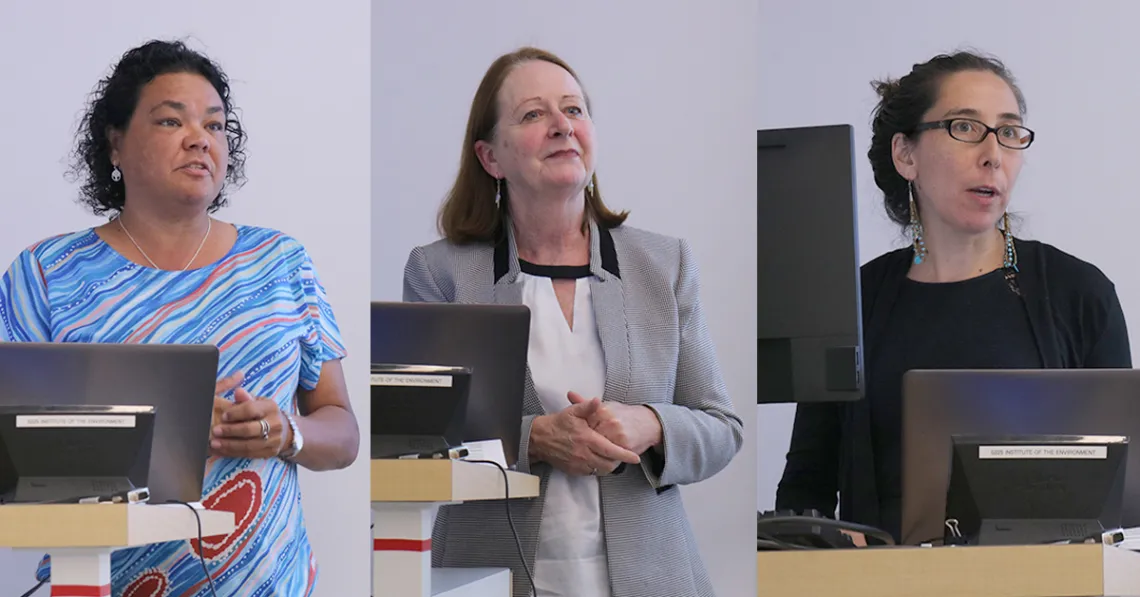Strengthening Indigenous Data Sovereignty Around the Globe and at Home in Tucson

In 2016, NNI Associate Director Stephanie Carroll Rainie (Ahtna Athabascan) and NNI Graduate Research Affiliate Desi Rodriguez-Lonebear (Northern Cheyenne) co-founded the US Indigenous Data Sovereignty Network (USIDSN), and in 2017 Rainie co-founded the International Indigenous Data Sovereignty Interest Group at the Research Data Alliance. Since then, Indigenous data sovereignty (IDS) has grown from a virtually unknown field to one that has emerged as cutting edge in the future of Indigenous sovereignty.
This fall Raine and NNI Research Specialist Andrew Martinez (Salt River Pima-Maricopa Indian Community) collectively attended four events and addressed how IDS helps to identify, develop, and examine Indigenous rights and ownership as it relates to data.
Data governance and nation rebuilding are integral to the success of the other. Rainie notes, "As tribes rebuild their governance institutions, they increase their capacity to govern their data, which in turn, facilitates stronger evidence-based decision-making." Native nations often existed in a data desert where information is gathered on or for them and not always to their benefit. Increasing reliance on technology and data collection, however, has given rise to new interest in data as a tribal resource. As a result, many tribes are creating positions and departments to take over the management of data once assumed by external organizations. This growing demand for data and an emphasis on governing information create much-needed opportunities for tribes to assert Indigenous data sovereignty in new and exciting ways.
With the growth of IDS, Native nations also need to establish governance systems to safeguard and manage their data. Rainie and NNI engage with tribes, governments, and organizations to support the creation of processes and mechanisms for the management of data for such purposes as tracking health statistics and economic growth, but also to influence how external data collectors and users steward and apply it. This is IDS in action, it is about placing primacy on the right of Indigenous people to control their knowledge, data, and information. Rainie, Rodriguez-Lonebear, and Martinez collaborated to create networks that both shape and protect this principle. Rainie and Martinez emphasize the importance of looking at data as more than a point of reference or mere statistic. They talk about how at the root and foundation of data information is the story of Indigenous Peoples, and that is always sacred.
RAINIE PRESENTED/HOSTED:
|
|
"Indigenous Data Sovereignty" at the International Open Data Conference: Data + Indigenous Impact and Mind the Gap-Mapping the Open Data Ecosystem Action Sessions BUENOS AIRES, ARGENTINA |
|
|
"Indigenous Data Sovereignty and the Governance of Indigenous Data at Academic Institutions" in collaboration with the Maiam nayri Wingara Indigenous Data Sovereignty Network (AU)
TUCSON, ARIZONA |
|
|
"Indigenous Data Sovereignty and the Governance of Indigenous Data" at the Southwest Indigenous Climate Summit hosted by NNI, USIDSN, and the Climate Assessment for the Southwest (CLIMAS) TUCSON, ARIZONA |
MARTINEZ PRESENTED:
|
|
"Perspectives on Linkage Involving Indigenous Data Sovereignty" at the International Population Data Linkage Conference BANFF, ALBERTA |

